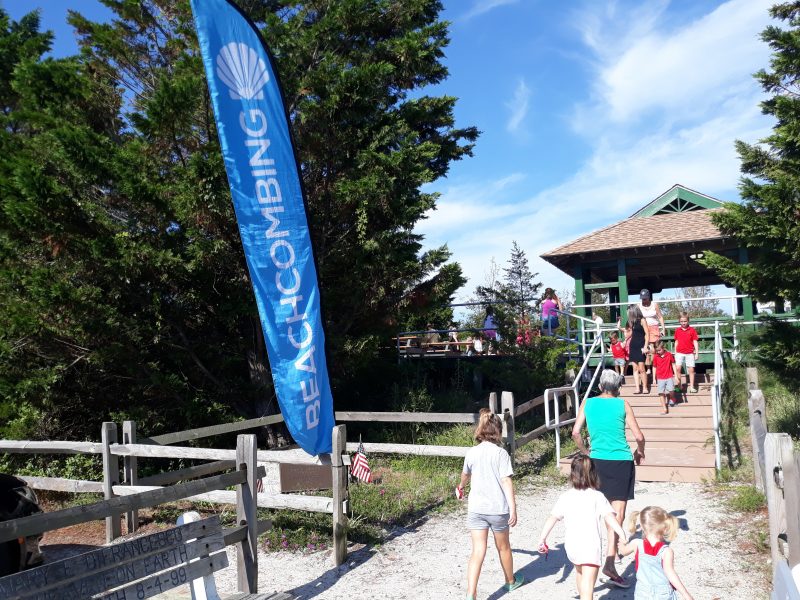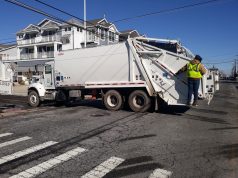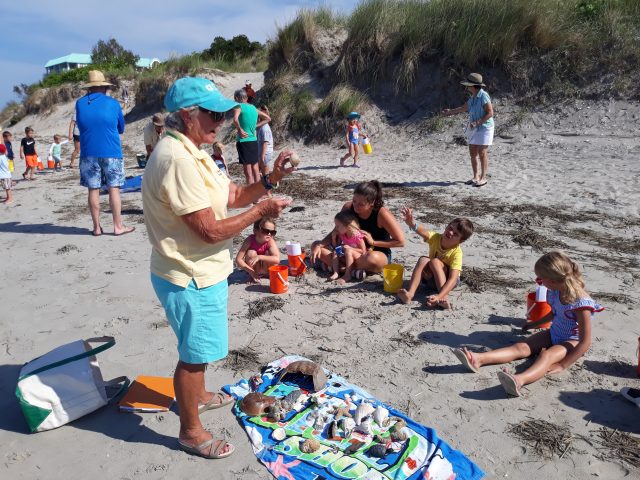
By DONALD WITTKOWSKI
Margie Quinlan posed what seemed like an easy question to a group of beachcombers who were listening to her presentation Thursday on sea life: What creepy looking creature has 12 eyes, 12 legs and is a member of the arachnid family?
Sorry, if your answer was a water spider, you flunked the quiz.
Quinlan held up the shell of a horseshoe crab to let everyone know that this was the bizarre aquatic critter she described.
“A horseshoe crab is not a crab. They are in the spider family,” she explained.
For 15 years, Quinlan has served as one of the volunteer guides on Sea Isle City’s beachcombing tours that mix education with fun while teaching children and their parents about the diverse seashore environment and marine life.
Thursday’s gathering on the 94th Street beach in Townsends Inlet was the last beachcombing tour for the 2020 summer season – a season that was anything but normal because of the coronavirus pandemic.
“We didn’t have the big crowds this summer that we’re normally used to. We normally have big family groups of 15 to 20 people. This year, we had groups of about 10 people,” Quinlan explained of the number of beachcombers assigned to each guide.
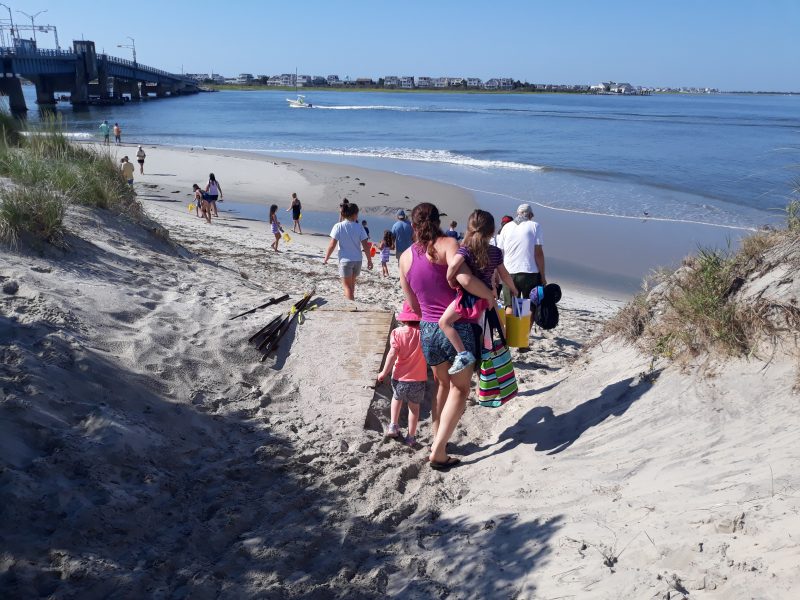
Sponsored by the Sea Isle Environmental Commission, the tours have been a staple of the beach town’s family-friendly summer activities for 32 years. But this summer, they started about a month late while organizers devised safety protocols to protect the beachcombers and guides from COVID-19.
Social distancing was required at all times. Some of the tour guides literally drew lines in the sand while they were giving their presentations to create a safe buffer between them and the beachcombers. Masks were not required because the tours were outside, but they were encouraged.
“Everybody was good with the masks and followed the safety guidelines,” said Abby Powell, who directs the tours for the Environmental Commission.
Powell praised the guides for doing an “amazing job” during the pandemic.
She promised that the tours will return next summer. Although the public tours have ended for this year, the Environmental Commission will offer private “family tours” through September.
As with all of the beachcomber tours, private gatherings are free, but donations will be accepted in support of the beachcombing mission to educate the public and help protect the environment. Arrangements for private tours can be made by calling Powell at (215) 595-4601.
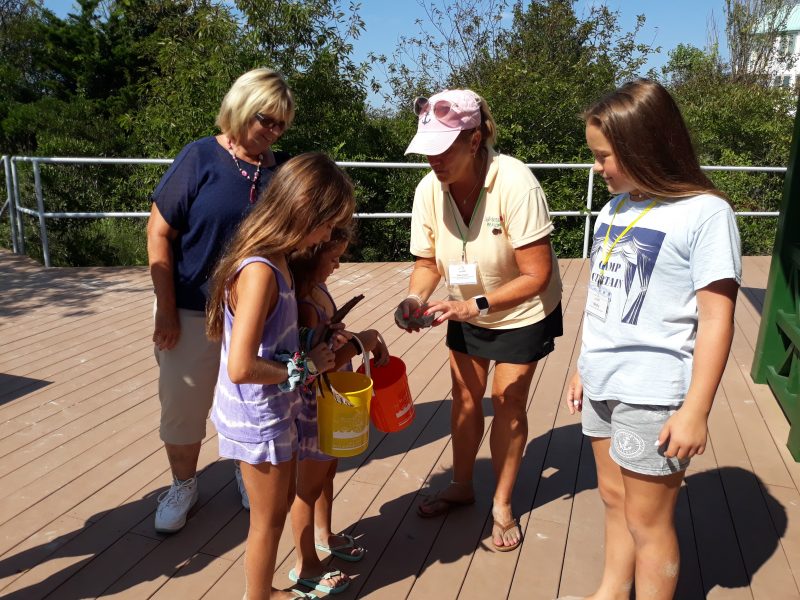
Over the course of the summer, the hour-long public tours were held on Tuesdays at the 29th Street beach and on Thursdays at the Townsends Inlet Waterfront Park off 94th Street.
The guides spread a blanket or towel on the sand to display an assortment of seashells, crabs, starfish and other marine life that are used to illustrate their remarks about the ocean and other facets of the shore.
In the past, children were encouraged to hold the shells, but they were not allowed to touch anything for most of this summer to prevent the possible spread of the coronavirus. Children in Quinlan’s group were permitted to touch some of her shells on Thursday, but only after she had sanitized everything beforehand.
Children taking the tours are given some environmentally themed goodies, including shell-collecting plastic buckets. They also receive a beachcomber bracelet, a coloring book decorated with marine life and a certificate proclaiming them as stewards of the environment.
In previous years, the children were given their buckets before the tours began and their bracelets and coloring books afterward. This summer, everything was handed out before the tours started to limit the exposure between the guides and beachcombers, Powell said.
For Caitlin Glaws and her children, beachcombing is a family tradition. She brought along her son, Jack, 6, and daughters Maddie, 5, and Lilly, 3, for Thursday’s tour. She noted that Jack enjoys the tours so much that he has been coming to them for the last three years.
“He absolutely loves them,” she said.
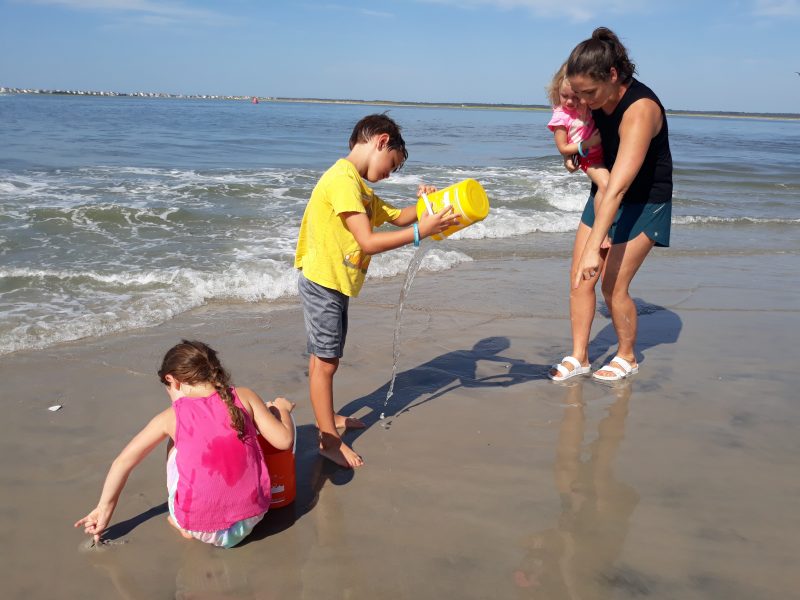
Glaws, now 32, began taking the same beachcombing tours when she was a child. She lives in Bridgewater, Somerset County, but her family has a Sea Isle vacation home on 93rd Street that has been owned over the years by her great-grandparents, grandparents and now her parents.
“This is kind of nostalgia for us,” Glaws said of the tours. “But it also teaches the kids a lot of stuff about the environment. They look forward to coming every year.”
Although the tour guides are normally the ones educating the beachcombers, Jack Glaws took the lead during part of Quinlan’s presentation.
“How big does a crab get?” he asked at one point.
Quinlan paused for a moment, let out a smile and said, quizzically, “How big does a crab get?”
“This is how big,” Jack replied while stretching out his arms all the way.
Perhaps when Jack becomes an adult, he can serve as a beachcombing guide, too.
